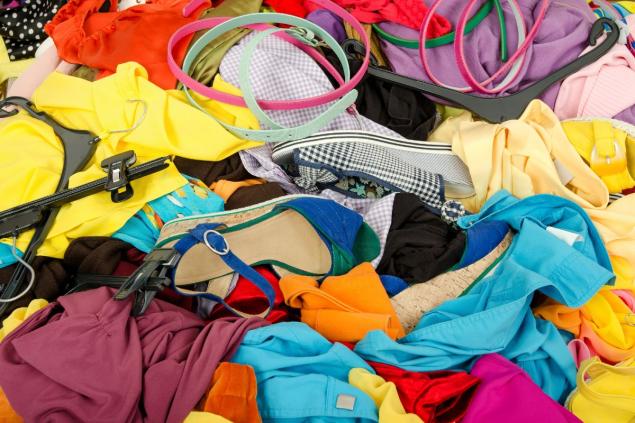154
This year I will not succumb to the hype and will not go to buy anything on Black Friday, I become more conscious.
The age of consumption calls us to buy more and more often, to seek happiness in material things, and to pursue fashion. As a result, not only our finances and psychological health suffer, but also the environment. In this article, we're going to say, Who are the underdogs and why it is worth adopting their philosophy.

Minzumeras are people who advocate conscious consumption. The original English name minsumers combines two words: Minimum (minimum) and Consume (consume)This reflects the philosophy of the movement. Minzomers urge to approach shopping wisely, to purchase only what is really necessary.

That doesn’t mean you have to limit yourself in everything. The main idea is that Minimize impulsive purchasesBe a responsible buyer. Let’s face it, material things make us happy for the first couple of days or weeks. Then many of them completely go into the category of junk and lie in the closet idle, only taking up space. This is especially true of clothing.

Conscious consumers always pay attention to the balance of price and quality. They wonder how much they need something, how long it will last. Ultra-fashioned trends are not for them. Because the minzomers care about this. The environmental impact of textiles and changing fashion.
For example, The textile industry emits more than one billion tons of CO2 annually.. This is more than all international flights and shipping. And pollution of the oceans with microplastics from textile fibers? And the use of toxic chemicals? Perhaps we should write a separate article about this... But the essence of the problem is probably clear from several proposals.

Mindless consumption and its harmful effects on the environment is not a new topic. However, the pandemic and the lockdown forced people to seriously reconsider their attitude to things. We suddenly realized we didn’t need that much clothing. Yes, the quarantine is over, but the dresses we wore once have already gone out of fashion. Quarantine has also taught people to be more cautious about money.

Of course, Minzoomers do not encourage anyone to walk in the same sweater for 5 years or buy things only in second-hand. It’s great that today most people can afford to buy new, quality things. The only problem is that the capitalist system forces us to get off the brakes. Advertising suggests you need to have moreOnly in new clothes will you look stylish. Discounts tempt, creating the illusion of a profitable purchase.

A reasonable approach to shopping will not only help the environment, but also It will have a positive impact on your finances.. Just analyze the junk that's accumulated at home. How much money (and closet space) could you save without buying it all?
Becoming a conscious consumer is easy. Here are some simple tips to help you spend money wisely:
Conscious consumers not only do not buy too much. They are also interested in sorting and recycling garbage, go to the store with reusable bags and containers. They are interested in how their actions affect the environment, how the age of consumption is changing the face of the planet. For them, it is important what materials the product is made of, what carbon footprint it leaves.

Minzumeras are people who advocate conscious consumption. The original English name minsumers combines two words: Minimum (minimum) and Consume (consume)This reflects the philosophy of the movement. Minzomers urge to approach shopping wisely, to purchase only what is really necessary.

That doesn’t mean you have to limit yourself in everything. The main idea is that Minimize impulsive purchasesBe a responsible buyer. Let’s face it, material things make us happy for the first couple of days or weeks. Then many of them completely go into the category of junk and lie in the closet idle, only taking up space. This is especially true of clothing.

Conscious consumers always pay attention to the balance of price and quality. They wonder how much they need something, how long it will last. Ultra-fashioned trends are not for them. Because the minzomers care about this. The environmental impact of textiles and changing fashion.
For example, The textile industry emits more than one billion tons of CO2 annually.. This is more than all international flights and shipping. And pollution of the oceans with microplastics from textile fibers? And the use of toxic chemicals? Perhaps we should write a separate article about this... But the essence of the problem is probably clear from several proposals.

Mindless consumption and its harmful effects on the environment is not a new topic. However, the pandemic and the lockdown forced people to seriously reconsider their attitude to things. We suddenly realized we didn’t need that much clothing. Yes, the quarantine is over, but the dresses we wore once have already gone out of fashion. Quarantine has also taught people to be more cautious about money.

Of course, Minzoomers do not encourage anyone to walk in the same sweater for 5 years or buy things only in second-hand. It’s great that today most people can afford to buy new, quality things. The only problem is that the capitalist system forces us to get off the brakes. Advertising suggests you need to have moreOnly in new clothes will you look stylish. Discounts tempt, creating the illusion of a profitable purchase.

A reasonable approach to shopping will not only help the environment, but also It will have a positive impact on your finances.. Just analyze the junk that's accumulated at home. How much money (and closet space) could you save without buying it all?
Becoming a conscious consumer is easy. Here are some simple tips to help you spend money wisely:
- Don't fall for the discounts. Yes, it is nice to buy something you like at a reduced price. But before buying, you should think: “Will I buy this thing if there is no discount on it?” Unfortunately, very often we are driven only at a pleasant price, and the product itself is not so necessary.
- Buy quality things. It would seem that not everyone has the money to spend on expensive products of elite brands. But the saying that the stingy pays twice is true. It is better to buy a pair of shoes that will reliably last several seasons than in six months to run for a new one, because the old sole fell off.

- Don't follow trends. Fashion is very volatile, so try to buy more classic things that are timeless and will not look old-fashioned next year. Bet on what suits you personally, not the models in the photo and mannequins.
- Go through the wardrobe every six months. First, you will be able to appreciate how many unnecessary things are in your wardrobe. And secondly, you may find that you already have 3 pairs of black jeans, and the 4th will be superfluous.
- Make a shopping list and bring a limited amount of money. Don't go shopping aimlessly. Often, the story of “I’ll see” ends with an impulsive purchase. When shopping, determine exactly what you need to buy and stick to the list.

- If something breaks, don’t run for a new one right away. Yeah, things break, they break, they go bad. But in many cases they can be repaired. If it is not possible to repair yourself, seek advice from a specialist. Repairs are probably cheaper than buying a new item.
- Take your things. For example, if you need a book from a friend, you do not need to buy a copy, you can just borrow.
Conscious consumers not only do not buy too much. They are also interested in sorting and recycling garbage, go to the store with reusable bags and containers. They are interested in how their actions affect the environment, how the age of consumption is changing the face of the planet. For them, it is important what materials the product is made of, what carbon footprint it leaves.
What is the difference between sauerkraut and salad cabbage
I rip the tulle from the windows, but I don’t throw it away, I found non-standard ways to use it.

























